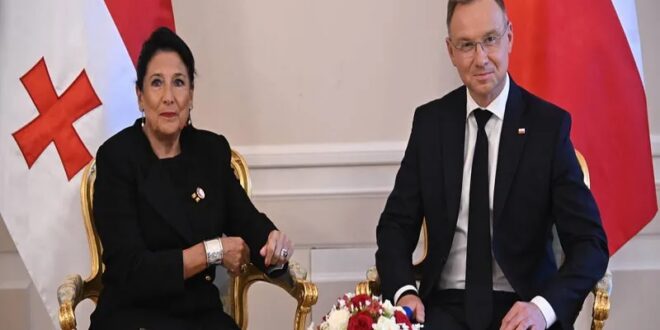Polish President Andrzej Duda can’t be smeared as a “Russian agent” by any stretch of the imagination or suspected of even being remotely sympathetic to that country after all that he’s done to help Ukraine fight against it since 2022.
French-born President of Georgia Salome Zourabichvili, who also used to be the French Ambassador to Tbilisi, accused Russia of conducting a “special operation” after the ruling Georgian Dream party with whom she’s feuding won a majority during last weekend’s parliamentary elections. This figurehead leader then called on her people to protest, which can be considered a punitive Color Revolution for her opponents’ refusal to sanction Russia and open a second military front against it in the South Caucasus.
Her Polish counterpart Andrzej Duda, who by no stretch of the imagination can be smeared as a “Russian agent” or suspected of even being remotely sympathetic to that country after all that he’s done to help Ukraine fight against it since 2022, just dropped a bombshell that completely discredits her narrative. Here’s what he told Radio Zet that they talked about last month and on Monday as translated into English from his remarks that were published in Polish on that outlet’s website:
“We talked about the general political situation and she outlined to me that Georgian Dream will probably win, but there is no indication that it will gain such an advantage that will allow them to govern on their own. The result that is being announced clearly contradicts what the president told me [last month]…(And during our latest talk,) The president did not say clearly [that Russia meddled], because there is no clear evidence for this, but let’s say that [Georgian Dream are] in a sense pro-Russian forces.”
Poland co-founded the EU’s Eastern Partnership in 2009 that was employed by the bloc to expand its influence in the remaining six former Soviet Republics in Europe besides Russia that had yet to join. It therefore considers itself to be a regional leader whose top representatives’ positions on newsworthy events in those countries are authoritative. Although he supported Zourabichvili’s call for an international inquiry, his contradiction of her claims about Russian meddling is thus very significant.
He could have lied about what they discussed a month ago and on Monday, not to mention leaving out how she lacks any evidence to back up her claim of Russian meddling during last weekend’s polls, yet he told the truth to his credit and consequently complicated the West’s narrative. Foreign Minister Radek Sikorski, who represents Duda’s party’s rival in Poland’s complex political set-up after last fall’s elections, swiftly rebuked him in a similar manner as he did in spring when Duda talked about hosting US nukes.
Just like back then, Sikorski reminded Duda that “Foreign policy is conducted by the Council of Ministers, so before making a decision on a possible trip to Georgia, President Duda should familiarize himself with the government’s position on this matter.” This was in response to Duda telling Radio Zet that he considers it his “duty” in travel to Georgia “if there is a situation where it will be necessary”. The message is that Duda should stop sharing foreign policy opinions that contradict the aforesaid Council’s.
With that in mind, Duda was either uninformed of the Council’s position when he shared what he discussed with Zourabichvili or he subverted it, both possibilities of which are plausible but speculation about this is moot since the indisputable outcome is that he completely discredited her narrative. It could also be that he was aware of the OSCE’s preliminary election observation report and naively assumed that the Council would go along with it since they hitherto relied on the group for guidance.
To be clear, Poland hasn’t claimed at the time of writing that Russia meddled in the elections, but Sikorski’s rebuke of Duda after he spilled the beans about his two recent conversations with Zourabichvili suggests that the Council is displeased with him for disclosing those sensitive details. Poland’s ruling coalition, which doesn’t include Duda’s party, might want to keep its options open for now and appears reluctant to endorse her meddling claims due to the OSCE’s politically inconvenient report.
Instead of confirming Zourabichvili’s fraud and meddling accusations like she assumed they would, they only shared some minor criticisms like they do with practically every election they observe, and they also surprisingly had some very positive things to say about the electoral process. This includes writing that “the legal framework provides an adequate basis for conducting democratic elections” and “Election day was generally procedurally well-organized and administered in an orderly manner”.
They also noted that “The initial phase of processing results protocols and election materials by [District Election Commissions], observed in all 73 electoral districts, was generally positively assessed.” Nevertheless, because of the OSCE’s minor criticisms and the disproportionate attention that the West paid to Zourabichvili’s scandalous accusations, Georgian election officials announced that they’ll recount ballots at five randomly selected polling stations in each voting district to confirm the polls’ legitimacy.
Considering the OSCE’s politically inconvenient report, Duda’s revelations about what he recently discussed with Zourabichvili, and the ongoing random recount that’ll dispel all reasonable doubt about the results once it’s done, there’s no reason to lend credence to Zourabichvili’s claims. This doesn’t mean that external forces might not orchestrate another Color Revolution, but just that the pretext upon which that might happen is totally false, which all honest observers should keep in mind going forward.
 Eurasia Press & News
Eurasia Press & News




